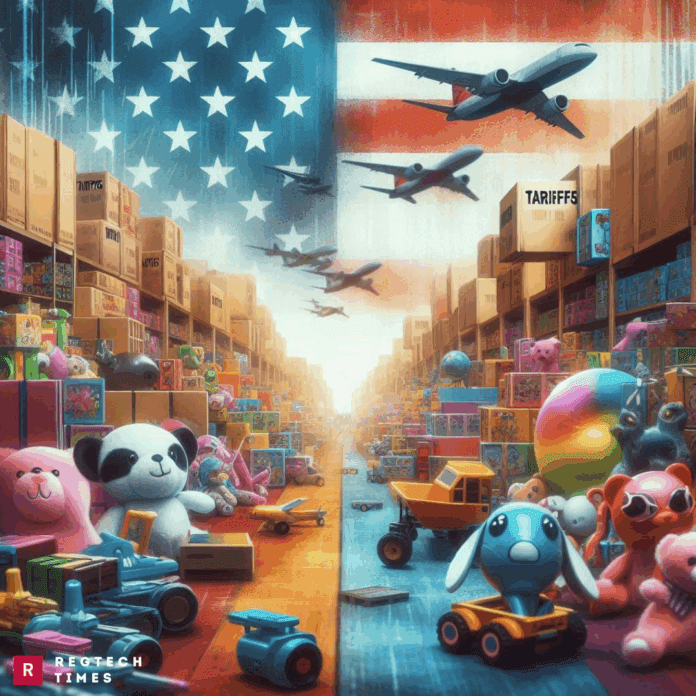In a giant toy market in a city of China called Yiwu, toy planes buzz through the air while sellers and buyers talk business. The place is packed with colorful toys—robots, stuffed animals, and superhero figures—lining every inch of the stalls. It’s noisy, busy, and full of life.
But something important has changed. Many Chinese sellers used to send their toys to the United States. Now, they don’t seem to care much about selling there anymore.
Why? Because the U.S. has made it more expensive to buy Chinese toys. This is due to something called “tariffs”—extra taxes placed on goods from China. These tariffs can go as high as 245%, which means a toy that used to cost $10 might now cost more than double.
That’s a big deal. China sold around $34 billion worth of toys last year, and about $10 billion of that went to the U.S. But now, sellers in Yiwu say they’re finding new customers in places like South America and the Middle East.
“We don’t need America,” some of them say. “Other countries have money too.”
This new attitude shows how China is reacting to U.S. pressure. Sellers have decided not to rely so much on the American market. And with 75,000 shops in Yiwu alone, there’s a lot of business to be found elsewhere.
Businesses on Both Sides Hurting
In the U.S., many small toy companies are feeling the impact too. Some shop owners say these new tariffs are hurting their business badly. One business owner even said the whole toy industry in America might collapse if this continues.
The reason is simple: Most toys in American stores are still made in China. It’s not easy to find new suppliers, because Chinese factories have spent decades learning how to make toys quickly, cheaply, and in huge numbers.
Some U.S. toy shops have already canceled orders worth hundreds of thousands of dollars. Others are stuck with stock they can’t afford to sell at higher prices. That means shelves may be emptier, especially during the holidays, and shoppers may have to pay more.
Even big stores like Walmart and Target are warning about this. They told the U.S. government that prices will go up and products might run out. They say the supply problems could last until Christmas.
Desperation or Strategy? China Considers U.S. Tech Tariff Exemptions Amid Economic Strain
Meanwhile, Chinese exporters are also feeling the pinch. Factories in other cities like Guangzhou say their shipments to the U.S. have slowed down. Some have goods piling up, waiting for buyers who are now uncertain.
China’s economy is already struggling with problems like weak consumer spending and a housing crisis. So, these tariffs come at a tough time. Factory activity has slowed, and experts predict slower economic growth this year.
Still, in places like Yiwu, the market is adapting. Sellers are finding customers from other parts of the world. Buyers from Dubai, Colombia, and Nigeria are now regular visitors.
New Markets, New Languages
As fewer American buyers show up, the people in Yiwu are preparing to do business with others. Shops now decorate their signs with greetings in Spanish and Arabic. In one shop full of fluffy bunnies and bears, a buyer from South America says this trade war is actually giving people like him more chances to work with China.
America’s Tariff Blow Sends Shein Prices Through the Roof
Even Christmas decorations—90% of which come from Yiwu—are now being packed for South American homes instead of just American ones. Sellers say they’re focusing more on buyers from countries that aren’t adding high taxes to their goods.
So, while the trade fight between China and the U.S. continues, Chinese businesses are busy opening new doors. Even though many factories are feeling the pain, markets like Yiwu show that China is moving forward, with or without American buyers.


